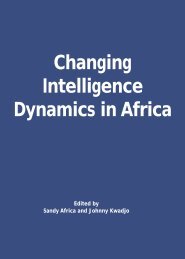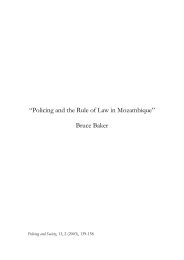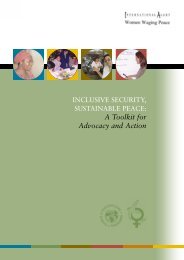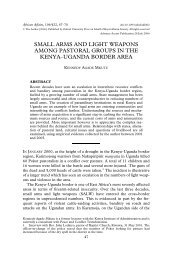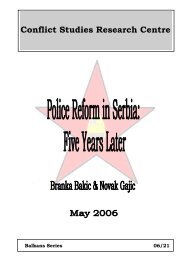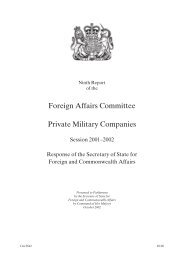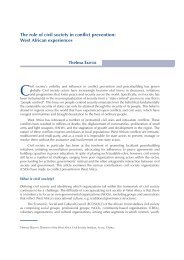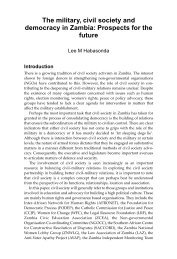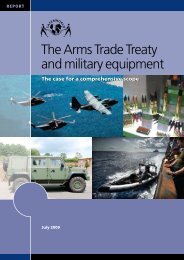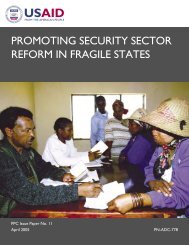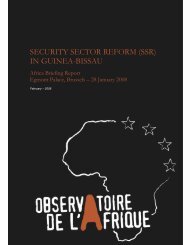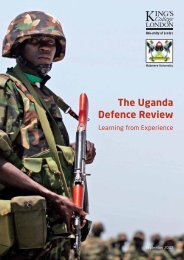AFGHANISTAN'S ELECTION CHALLENGES
AFGHANISTAN'S ELECTION CHALLENGES
AFGHANISTAN'S ELECTION CHALLENGES
You also want an ePaper? Increase the reach of your titles
YUMPU automatically turns print PDFs into web optimized ePapers that Google loves.
Afghanistan’s Election Challenges<br />
Crisis Group Asia Report N°171, 24 June 2009 Page 20<br />
delayed, with it being unclear how much effort and<br />
time the security institutions put into validating the<br />
information on illegal armed groups gathered initially<br />
from provincial governors. The quality of the data is<br />
uncertain in what was a very opaque process subject to<br />
political pressures. The wider disarmament process<br />
needs to be strengthened, far greater consultation<br />
must be undertaken, and data should be gathered in a<br />
more open and robust manner. Information must be<br />
improved before vetting for the 2010 polls, with the<br />
international military forces and national contingents<br />
demonstrating far greater commitment to the process.<br />
By the time the final candidate lists were declared,<br />
another presidential candidate and 90 provincial<br />
council candidates (including thirteen women) had<br />
voluntarily withdrawn their names. 148<br />
V. 4STRENGTHENING ELECTORAL<br />
CREDIBILITY<br />
These polls will not be – and were never going to be –<br />
perfect. Yet it is disappointing that more was not done<br />
in the interim years. Any move to set the bar too low<br />
in order to simply get the process done must still be<br />
resisted. If standards slide too far in the face of expediency,<br />
the results will have no legitimacy at all, fuelling<br />
tensions nationwide and undermining public confidence<br />
in the new systems. Every attempt must be made<br />
to ensure the presidential and provincial council polls<br />
this August and the 2010 parliamentary and district<br />
elections are as free and fair as possible and that,<br />
looking ahead, electoral processes and institutions are<br />
strengthened, embedding norms and practices for<br />
longer-term sustainability.<br />
A. 14LEVELLING THE PLAYING FIELD<br />
The highly centralised constitutional set-up, exclusion<br />
of political parties from the electoral framework, and<br />
the failure to create many of the mandated representative<br />
bodies adds up to a system in which it is exceedingly<br />
difficult to defeat a presidential incumbent. While most<br />
others holding a position of power must resign to run<br />
for office, the president remains in place with powerful<br />
instruments at his disposal including the appointment<br />
of ministers, provincial and district governors<br />
and security personnel. These power-holders thus rely<br />
on presidential patronage and lack independent constituencies,<br />
both stunting the development of potential<br />
rivals and creating a powerful national network of<br />
dependents. Parliamentarians and provincial council<br />
members can also remain in office, but with far less<br />
authority and fewer resources at their disposal, the advantages<br />
of incumbency are less significant.<br />
1. 27State resources<br />
According to a state monitoring body, during the 2004<br />
election campaign Karzai received 75 per cent of state<br />
television and radio coverage and launched donorfunded<br />
reconstruction projects throughout the country<br />
– travelling in U.S. helicopters – right up to election<br />
day. 149 This time, his rivals did not want him to remain<br />
stan: Getting Disarmament Back On Track, 23 February<br />
2005 and Asia Report N°65, Disarmament and Reintegration<br />
in Afghanistan, 30 September 2003.<br />
148 “Final list for presidential and provincial council election<br />
candidates”, IEC press release, 13 June 2009. Further there<br />
were 510 corrections made to candidates’ names, symbols<br />
or party affiliation.<br />
149 “‘Heavy poll bias’ towards Karzai”, BBC News, 4 October<br />
2004. This was redressed a little when political advertising<br />
slots – available to all candidates – were taken into account,<br />
but Karzai still received three times as much coverage as<br />
any other candidate. See also “UNAMA Joint Verification<br />
of Political Rights Third Report”, 30 September 2004.



